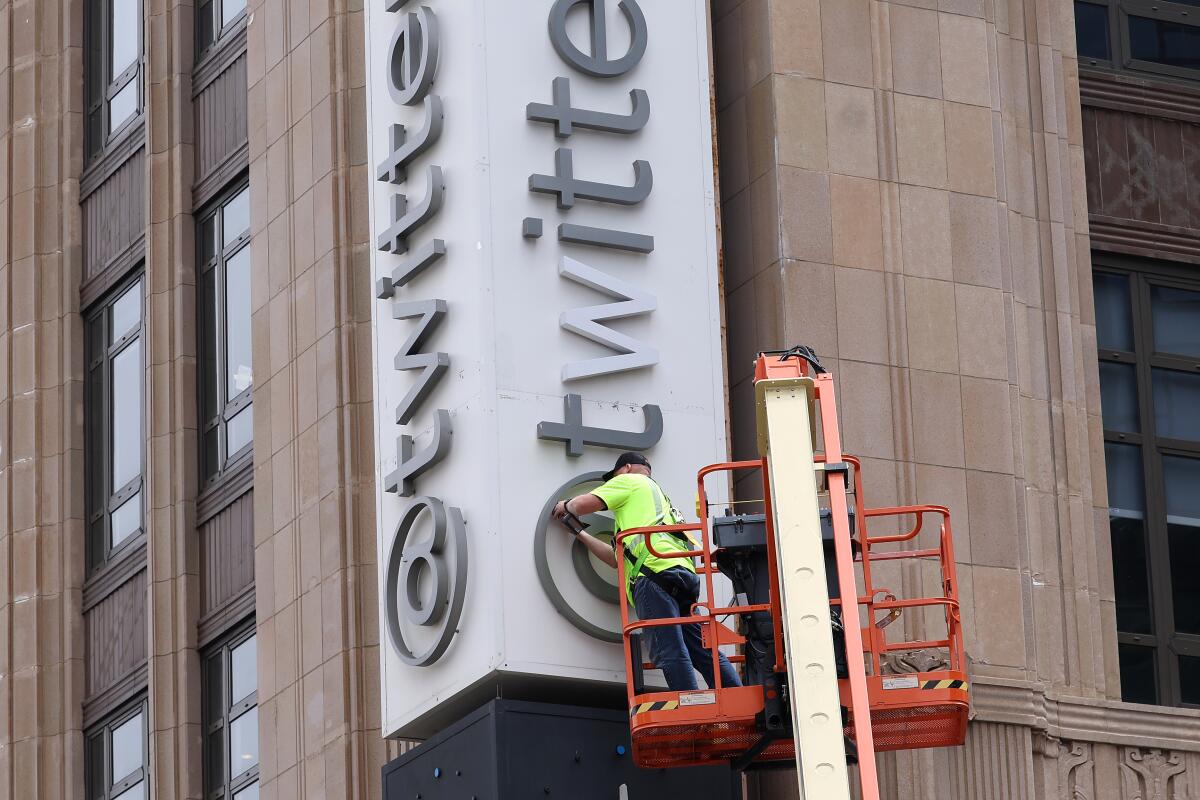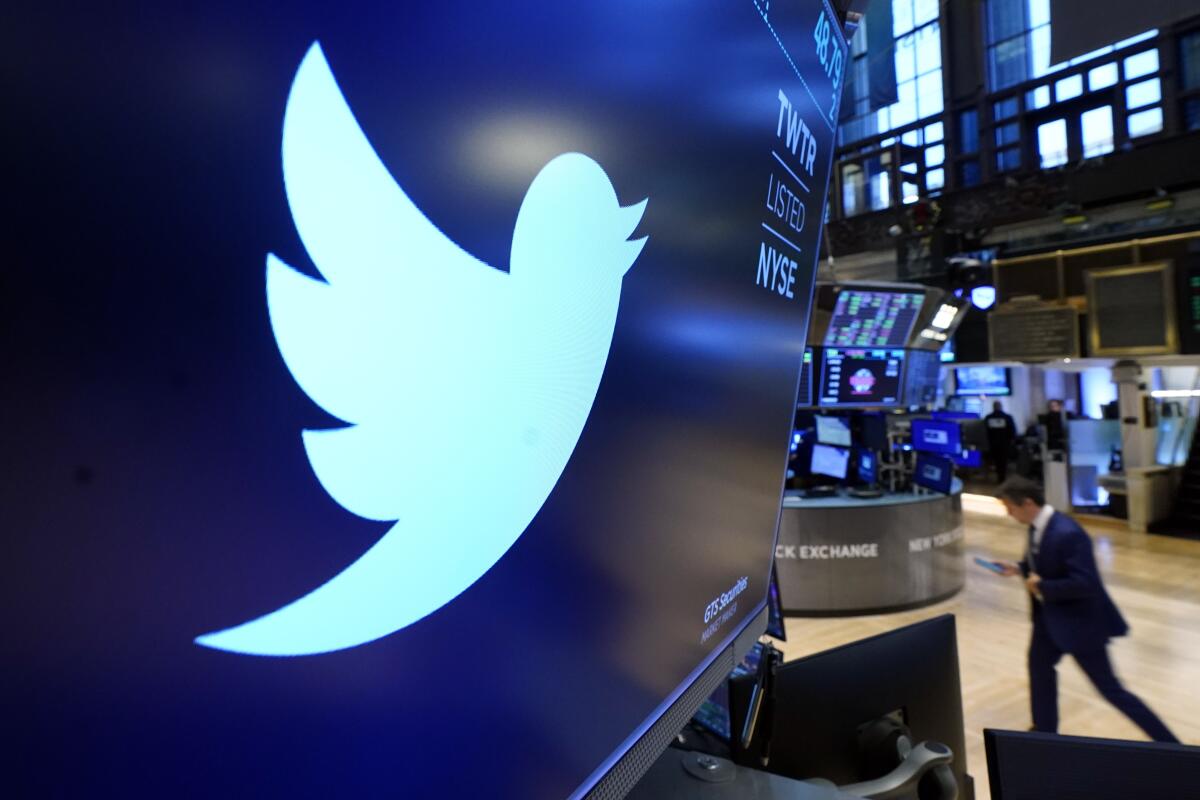When Elon Musk took over Twitter in 2022, it marked a new era for the struggling San Francisco company.
As the deal neared completion, Musk, the eccentric entrepreneur known for leading Tesla and SpaceX, tweeted, “Entering Twitter HQ — let that sink in!” with a video of him carrying a white sink into Twitter’s San Francisco office.
Two years later, the business is moving out.
Twitter, now known as X, is expected to close its San Francisco headquarters this month, leaving behind the Mid-Market neighborhood it has called home since 2012. The company is reportedly moving its headquarters to Austin, Texas, but plans to relocate its San Francisco employees to San José and Palo Alto, where it has already listed job openings.
The departure is another blow to a city that has been buffeted by high-profile business departures and that once held up Twitter as a key part of its revival. Downtown San Francisco’s vacancy rates have ballooned as tech companies slashed their real estate expenses and halted office expansion plans as the pandemic has relented.
Confronted with a falloff in foot traffic, major retailers such as Nordstrom and Anthropologie also shut their stores amid heightened concerns about crime, theft, vandalism, drug use and homelessness.
X is the second-largest tenant in the Mid-Market neighborhood, leasing 457,793 square feet, according to CoStar, which tracks real estate trends. Vacancy rates in Mid-Market are at their highest in decades at 62%, according to CBRE.

A worker removes letters from the Twitter sign that was posted on the exterior of the company headquarters last year after it was rebranded as X.
(Justin Sullivan / Getty Images)
“It’s just symbolic of the failure of this administration and the elected class in the city failing to keep our streets safe and clean, to making sure that we are focused on keeping businesses here and jobs here,” said mayoral candidate Daniel Lurie, founder and former CEO of nonprofit Tipping Point Community and an heir to the Levi Strauss & Co. fortune.
Mayor London Breed was not available for comment, a spokesperson said.
Some current and former city officials have downplayed the fallout from X’s move, arguing that earlier massive layoffs at the company and the rise of remote work have softened the impact of the company’s departure.
Others are directing their ire at X, noting that the company benefited from financial incentives provided by the city where it was born.
“Most of the city and most of the neighborhood take it as a stab in the back,” said Ludovic Racinet, co-owner of the Function, a comedy club down the street from X. “The city has done so much for Twitter, now X.”
Representatives of X did not respond to requests for comment.
‘We are part of San Francisco’
Twitter made its online debut in 2006, operating out of an office on South Park Avenue. While working at podcasting company Odeo, Twitter’s co-founder Jack Dorsey hatched the idea for a short-messaging service where people would be able to share updates with their friends.
The idea took off, rising in popularity after the founders unveiled the service at South by Southwest in 2007. Attracting celebrities, politicians, journalists and even astronauts, Twitter evolved into a social media powerhouse and a global online megaphone.
As Twitter grew in San Francisco, its founders searched for more space to house its expanding workforce. Eyeing a potential move to Brisbane, Calif., Twitter decided to stay in the city after San Francisco officials approved a temporary payroll tax break in 2011 that could save the company millions of dollars. City officials wanted to revitalize the area near the Tenderloin, a gritty neighborhood hit hard by the homelessness crisis.
“It was the middle of the global financial crisis,” said Ted Egan, chief economist for the city and county of San Francisco. “Decision-makers didn’t want to drive a company like that out of town.”
It worked. The tax break lured Twitter into moving to Market Square, an 11-story Art Deco building, in 2012. Leaving behind a much smaller office at 795 Folsom St., the new headquarters allowed the company to add thousands of new workers.
The new digs included perks and amenities that had become part of the tech culture: an outdoor roof deck, a game room, a workout room, cafeteria and plenty of bird-themed decor.
“San Francisco’s unique creativity and inventiveness is a part of Twitter’s DNA, and we feel like we are part of San Francisco,” the company said in 2011.
The tax break expired in 2019, but it remains controversial. It exempted Twitter, Zendesk and other companies located in certain Mid-Market buildings from San Francisco’s 1.5% payroll tax for any employees they added. The payroll tax included stock-based compensation, which could deter startups like Twitter that were about to go public from staying in the city. From 2011 to 2017, San Francisco lost out on $70 million in tax revenue. On average annually, about nine businesses took advantage of the tax break, according to a 2019 analysis by Egan.
The influx of tech investment had a downside. As more tech workers moved into the area, the cost of housing also increased, making the city less affordable.
Jane Kim, who was on San Francisco’s Board of Supervisors at the time, said she believes the tax break accomplished its goal.
“Twitter at the time was considered a major anchor tenant,” she said. “It was new, but I think people felt like it was going somewhere and there was this excitement about bringing all these young workers to a corridor.”

The logo for Twitter appears above a trading post on the floor of the New York Stock Exchange three years ago.
(Richard Drew / Associated Press)
After Musk takeover, relations sour
But the love between the city and the social media company didn’t last.
Twitter grappled with several challenges throughout the years including competition for ad dollars from bigger tech companies such as Facebook and Google, stalling user growth and criticism that the social network wasn’t releasing new features quickly enough. The company also went through numerous chief executive officers, which included Twitter’s co-founders Dorsey and Evan Williams.
A pivotal turning point came in 2022 when Musk offered to buy Twitter for $44 billion. After he tried to back out of the purchase, Twitter sued the billionaire to force him to go through with the merger agreement.
Worker morale reached a low under the new regime that demanded a “hardcore culture.” Musk told the BBC last year he slashed more than 6,000 jobs at the company, reducing about 80% of the workforce (Twitter said it had more than 7,500 employees in 2021).
Laid-off workers sued the company over allegations Musk refused to pay severance, violated labor laws and targeted older workers, women and people with disabilities in the job cuts.
Twitter reinstated users who had previously been banned on the social media platform, including former President Trump, who was kicked off after his rhetoric and social media posts were blamed for inciting violence at the U.S. Capitol on Jan. 6, 2021.
Musk was also accused of breaking city rules after an employee posted a photo of a woman sleeping on the office floor in a sleeping bag. Last year, Twitter was renamed X and later installed a giant flashing sign atop the headquarters, disrupting the sleep of nearby residents.
David Chiu, former president of San Francisco’s Board of Supervisors, said X hasn’t been a “good neighbor.”
“Elon Musk has allowed antisemitism, racism, homophobia, transphobia to flood the platform and in a way that is antithetical to the values of San Francisco,” said Chiu, the city attorney of San Francisco. “Since Elon’s takeover, Twitter has become such a hollow shell of itself that I doubt many will notice its actual departure.”
For the record:
9:50 p.m. Sept. 15, 2024An earlier version of this story incorrectly said SpaceX was moving its headquarters to Austin. The new headquarters will be near Brownsville, Texas.
Musk began signaling X’s exit this summer, first by announcing Hawthorne-based SpaceX would move to Texas, which he said was because he objected to a California state law that prohibits mandating teachers notify families about student gender identity changes. He later said X’s San Francisco headquarters would move to Austin, adding that he “had enough of dodging gangs of violent drug addicts just to get in and out of the building.”
The company is planning to close its headquarters in San Francisco on Friday, Fortune reported last month. In a staff memo, first reported by the New York Times, CEO Linda Yaccarino wrote that the decision was the “right one for our company in the long term.”
San Francisco’s Office of Economic & Workforce Development said the city remains a “prime location for any company interested in filling their place” due to its workforce, culture and concentration of tech innovators.
“We do not have any information about businesses taking X’s place in that building, but we can’t wait to help foster the next wave of start-ups and to see how they grow and change the world from San Francisco, the AI capital of the World,” the office said in a statement.
There are still remnants of Twitter’s past active role in its community. Around the corner from its headquarters was Twitter NeighborNest, a learning center that provided access to technology for the homeless and low-income families. It was part of a 2015 partnership with nonprofit Compass Family Services. It too was a victim of the social media company’s cuts.
The center closed during the height of the pandemic but was expected to reopen in 2023, Abbey Leonard, chief development officer at Compass Family Services, said in an email. But then Musk purchased Twitter, changing the trajectory of the company and upending programs to improve the surrounding community.
“At that point all hope of reopening the Nest was gone,” she said. “The entire team that ran all social responsibility was fired immediately and there wasn’t even anyone left to tell us it was over.”
Before Musk’s takeover, Leonard described Twitter as a great partner. Workers volunteered with nonprofits and the company even hosted a big holiday party, filled with food, entertainment and gifts, for their clients. Since Musk took over, communication with the tech company evaporated. “It’s a very big shift,” she said.
On Tuesday, the signage on NeighborNest’s former office remained, but dark blinds were drawn up in a vacant space inside and there were scratches on its front glass door. The area around X was dotted with restaurants and eateries that have shut down and several for-rent signs in the Market, a market and food hall located inside the office building.
The fallout for small businesses
“Generally in downtown San Francisco, most restaurants are highly dependent upon the daytime population of office workers, so when you have a situation where there aren’t that many there, it’s hard for these retail businesses to make a go of it,” said Colin Yasukochi, executive director of CBRE Tech Insights Center.
Perry Dann Pancho, an assistant manager at Poké Bar, an eatery inside the Market, said sales are down 20% to 30% from a year ago.
“Before [the pandemic], all the people from outside the Twitter building, they eat here,” Pancho said. “Right now, no one.”
Cristian Torres, co-owner of CTKempanadas, said he delivered more than 300 empanadas to X’s San Francisco office Tuesday. That day, Torres said X was giving away items like pillows and clothing and he scored a T-shirt with Twitter’s bird logo on it. He said 20% of his business comes from X or its employees.
“It’s sad to see them go,” Torres said, adding he hopes to still sell empanadas to X employees even after they move to San José. “I told them I will deliver over there.”
